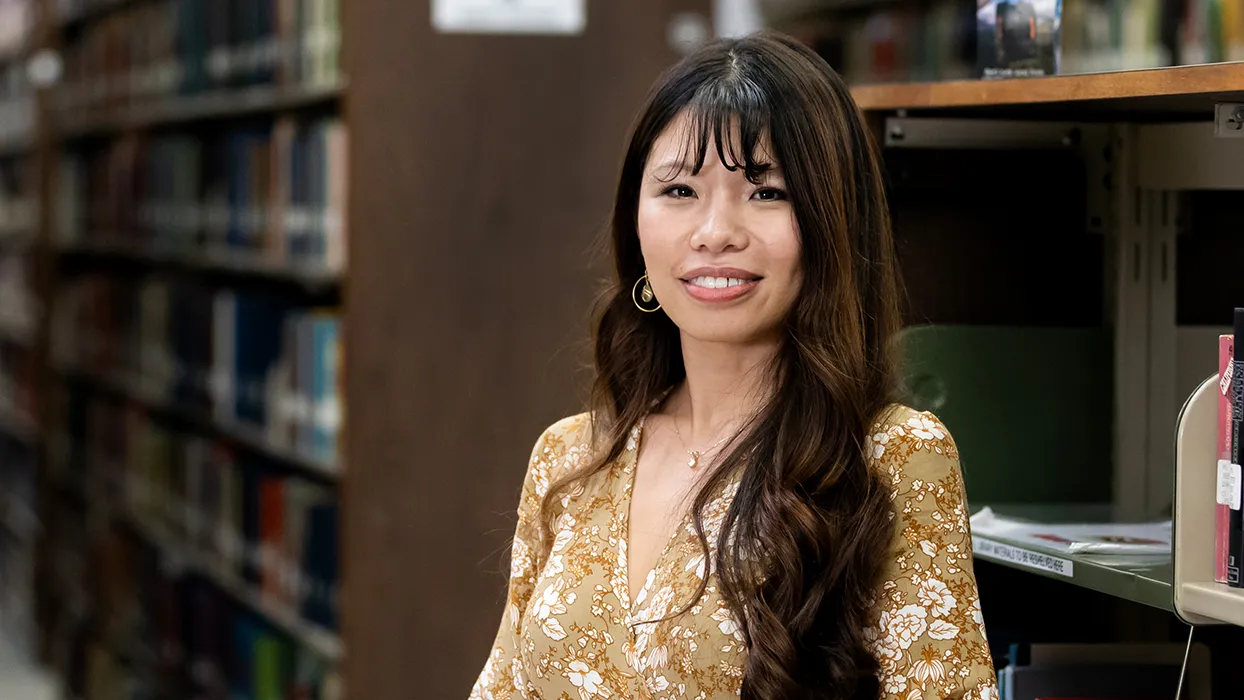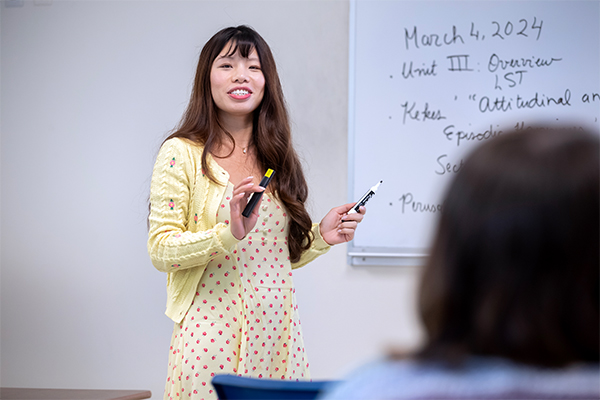Alan Llavore | Office of Strategic Communication | 909-537-5007 | allavore@csusb.edu


Each week during March — Womxn’s History Month — we’re profiling womxn faculty members who have pursued academic careers in male-dominated professions and have made significant contributions to their fields. Philosophy is one such field, with womxn comprising just a little more than 20 percent of college professors in the U.S.
Van Tu is an assistant professor in the department of philosophy at the College of Arts & Letters. Prior to joining CSUSB in 2022, she was a visiting instructor (2019) and later a visiting assistant professor (2020-22) at Bowdoin College. She completed graduate study in the program for ancient philosophy at the University of Michigan, Ann Arbor, earning a Ph.D. in philosophy in 2020 and an M.A. in classical Greek in 2019. After spending the last decade in the Midwest and New England, Tu notes that she is thrilled – and fortunate – to be able to continue a life of study in sunny Southern California, a place that better resembles Vietnam, the country of her birth and childhood.
What year did you become a university faculty member for the first time, and what was your experience like?
In 2019, I accepted my first faculty position as a visiting instructor at Bowdoin College. I remain grateful to members of Bowdoin’s philosophy department for their confidence in me, as they were willing to hire a Ph.D. candidate still in the process of completing her dissertation. Because I was in this transitional phase, my first year at Bowdoin was challenging. I had to finish my dissertation and prepare for the defense while learning about various aspects of being a faculty member, especially at a private liberal arts college strikingly different from the institutions I had attended. In the end, my experience at Bowdoin turned out to be instructive and rewarding. I learned to be a much more effective teacher due to the college’s emphasis on excellent undergraduate teaching and had the opportunity to work with some phenomenal students with whom I remain in close contact today. In fact, I am especially delighted that one of those former students was recently admitted to the Ph.D. program in philosophy at Boston University.

What is the best advice you were given when you became a faculty member (or when you decided to pursue a career in academia)?
The best advice I received came from an established, retired classics professor at Michigan State University, who was a regular visitor at a seminar I enrolled in as a graduate student. During one of the breaks midclass, we chatted about the abysmal academic job market. His advice, in a nutshell, was not to develop tunnel vision in believing that the single option for me – or anyone who undertook postgraduate studies – was to obtain a job in academia. The result of a Ph.D. is an extensive education, and it is up to me to decide how to use that education, an education that is already immensely rewarding in and of itself. Success and fulfillment need not be in the form of a linear path to a tenure-track job. This advice was particularly liberating and empowering at the time because it reminded me that I embarked on my academic journey simply because I love philosophy. My worth and identity need not be tied to an academic position.
What advice would you give students who identify as female who are interested in pursuing a career in your field of expertise?
Individuals identifying as female may have very different goals and preferences, so I acknowledge that my advice may not be relevant to every student. That said, since the most common question posed to me at mentoring events by female-identifying students is about my experience of giving birth to and raising a child while completing my graduate degree, my advice will be in this vein. As a female academic, you do not need to be apologetic for having desires and preferences that do not conform to the standard paradigm of a (typically male) academic, such as wanting to have a family or children. You can, and should, be unapologetically female, however you choose to express your female identity.
At CSUSB, we intentionally spell womxn with an X as an objection to the patriarchal idea that womxn are an extension to men and the inclusion of all womxn go beyond just cis-women.